
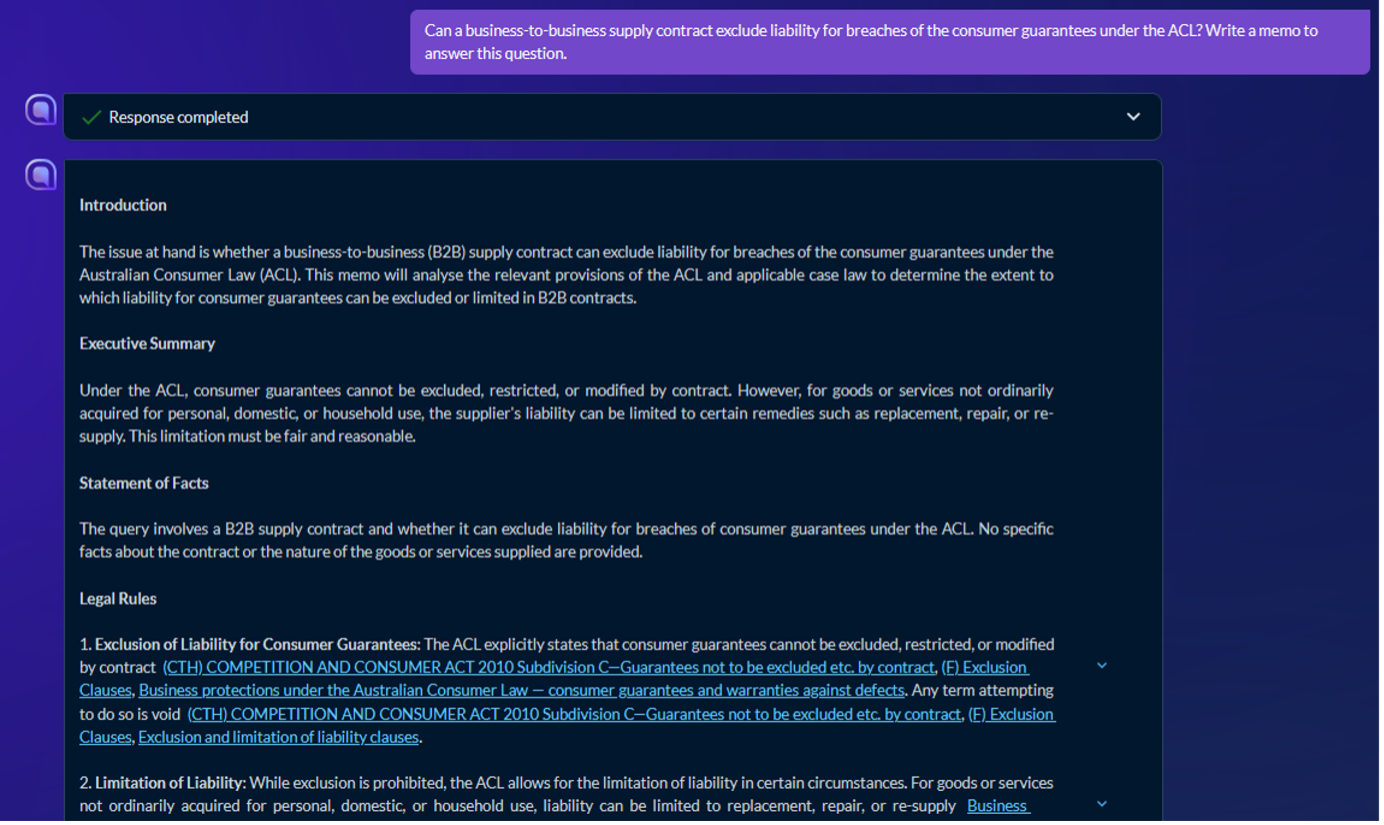
- …in the last 5 years
- …after 2015
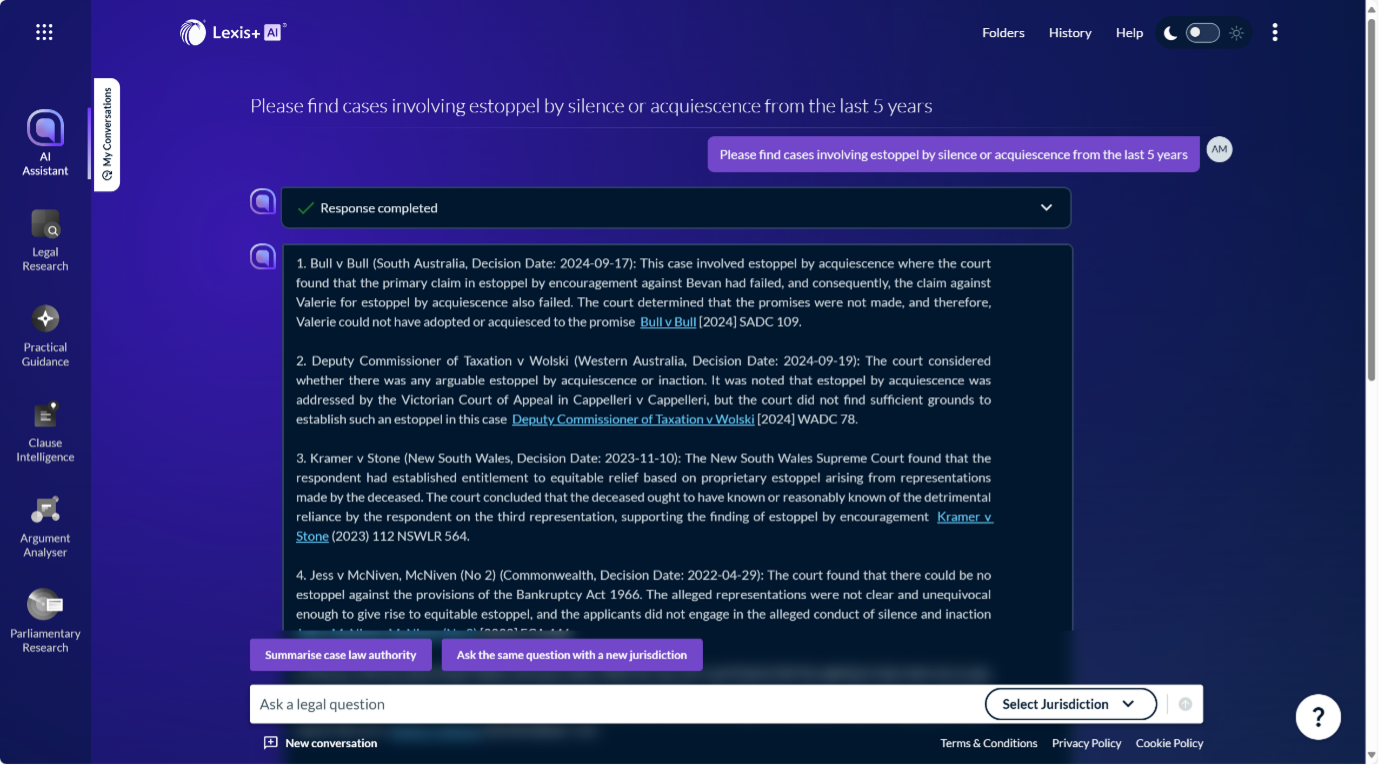

- Legislation Compare: Legislation Compare is an easy way to compare two versions of the same legislation and reduce the time taken to review how the law has evolved over time.
- Leading Cases: Lexis+ surfaces the cross-references to important cases for a legislative provision reducing search time and supporting legal research to drive better and more precise outcomes.
- Practical Guidance: Fully integrated practical guidance experience including practice notes, precedents, checklists, drafting tools, and industry insights from leading practitioners is now easily accessible from the home page and within legal research results.
- Lexis Answers®: Responds to natural language search queries with the best, most relevant answers from Caselaw taking users to its location within the document.
- Enhanced AI-Powered Search Capabilities that give lawyers more control over their research experience, including:
- Search Tree: Graphically depicts Boolean searches and highlights the impact of each keyword on search results, enabling users to refine and feel confident for the best results.
- Search Term Maps: Visually depicts clusters of terms within search results and documents across major content types for fast, easy navigation, trend identification, and direct access to the most relevant information.


- What Taylor Swift can teach us about copyright, contracts, and moral rights: The story of ‘Taylor’s Version’ from an intellectual property perspective —Wellett Potter
- A post-#MeToo reflection on Mueller v Swift — Sarah Ailwood
- Leveraging the parasocial relationship for intellectual property rights (Taylor’s Version) — Emma Perot and Justin Koo
On 9 May 2025, the South Australian Court of Appeal made an important ruling about the jurisdiction of the South Australian Civil and Administrative Tribunal (SACAT) in Henderson v South Australian Housing Trust [2024] SASCA 55. The case involved the long-term processes of evicting a Housing Trust client with hoarding disorder and the correctness of SACAT upholding the decision to evict in June 2023. The President of SACAT affirmed the Senior Member's decision that the lease be terminated and the property vacated. The Court of Appeal case raised key administrative arguments about s 34 and s 70 of the SACAT Act that deal with the tribunal making the “correct and preferable decision."
This decision has key implications for tribunal processes across Australia. It does make important remarks about what a “preferable” decision would be, and in what circumstances a tribunal can substitute such a decision. Given the wide jurisdictions of tribunals over many decisions in property, professional registration, guardianship, housing and mental health, this decision has key implications for practitioners.
Our SACAT author, Dr Anna Olijnyk, has authored three new commentary updates addressing the effect of Henderson v South Australian Housing Trust [2024] SASCA 55. These very timely updates will be annotations to s 34, s 70 and Pt 9A of the SACAT Rules. They will assist administrative lawyers and academics in better understanding the basis for distinguishing merits review from judicial review, and important observations of a superior court on the adequacy of tribunal reasons where a substituted decision is made.
This year will see the commencement of many of the reforms passed in the Anti-Money Laundering and Counter-Terrorism Financing Amendment Act 2024 which has been described by one of our authors as 'the most significant change in the Act's history.' The amendments will expand the current AML/CTF regime to certain professions and service providers such as real estate agents and lawyers. It will also seek to modernise the regulation of digital currency and of virtual asset and payments technology to meet international standards set by the Financial Action Task Force (FATF). Lastly, the Amendment Act will simplify and clarify the regime to increase flexibility, reduce regulatory impacts and support businesses. These significant changes will also trigger a series of new guidance notes and practice materials provided by AUSTRAC.
Our expert authors working on the Anti-Money Laundering & Financial Crime looseleaf are planning to hold a workshop to discuss the impact of the Amendment Act on the publication. This will assist in addressing and incorporating the changes cohesively across the chapters which are currently managed by four different authors. Depending on the scope and findings of the workshop, this is expected to lead to some considerable content development for the publicationexpected to be available around the same time or after the commencement of the reforms.
From 1 January 2026, a new mandatory merger control regime will commence, but some will commence as early as 1 July 2025. These are the biggest reforms in the Competition and Consumer Act’s 50-year history. With these, businesses seeking acquisitions which meet certain thresholds must notify the ACCC and wait for approval before proceeding.
Several key instruments were released by the ACCC to aid with understanding these reforms. This includes draft Competition and Consumer (Notification of Acquisitions) Determination—28 March 2025 - 02 May 2025. This instrument sets out the merger notification thresholds, sets additional targeted notification requirements for major supermarkets, and gives effect to the ACCC’s proposed notification forms. The ACCC's draft Merger Process Guidelines was released on 27 March 2025, and explains the processes the ACCC will use when assessing acquisitions under the new merger regime. Finally, the ACCC's draft Merger Assessment Guidelines was released on 20 March 2025, and outlines the analytical framework the ACCC will use when assessing notified acquisitions under the new regime.
Author annotations update by Ray Steinwall—Adjunct Professor at the University of New South Wales, Solicitor and Barrister of the Supreme Court in NSW and practitioner of the High Court. The updates to the Competition and Consumer Act 2010 guide card cover each instrument released by the Treasury and the ACCC in detail, and changes span across 2500 pages. These will provide further understanding and information on how the merger reforms will function, including tables that summarise the Determination. Customers will be able to follow along changes in real time, long before the regime actually commences—so that when it does, they are not behind in applying it in practice. More annotations are planned when the regime commences, both on 1 June 2025 and 1 January 2026. Editing is currently underway.
As the law regarding environmental, social and governance factors (ESG) develops with regard to Corporations, the detrimental effects of 'greenwashing' (a deceptive tactic whereby corporations create an impression that their operations are more sustainable or environmentally friendly than they actually are) are coming to light. Over the last year, there has been an ongoing case between Active Super and ASIC, where it was alleged that Active Super contravened the law when it invested in various securities that it claimed were restricted by its ESG investment screens. The case was finalised in March 2025 when the Federal Court imposed a penalty of $10.5 million against Active Super for their greenwashing conduct.
The case between ASIC and Active Super has appeared in numerous articles across the Corporations portfolio as the case has progressed since June 2024. Most recently, HSF have produced an article in Butterworths® Corporation Law Bulletin titled 'The Cost of Greenwashing: Active Super's A$10.5M Fine and ASIC's Tough Stance on ESG Misconduct' which highlights the legal basis underpinning the claims that ASIC may advance in such proceedings. These cases are often complex and lengthy, so an article such as this provides a succinct analysis of the issues, a very valuable source of information for those in the Corporations space. It demonstrates the growing concerns around ESG claims and considerations and serves as a timely review of how Corporations are required to conduct themselves in this ever-changing area of law.
The High Court of Australia (HCA) recently handed down Bushell v R [2025] NSWCCA 23; BC202502591, in which it ruled that as self-injection of a lethal dose of narcotics is not capable of being manslaughter (because you cannot commit manslaughter upon yourself) the applicant was not capable of being an accessory to manslaughter on the basis of an "unlawful and dangerous act" (which a jury convicted him of), with the act in question being supplying and encouraging the deceased to inject the cocktail of drugs which killed him (in circumstances which suggested the deceased may have been murdered by bikies, ie, they had injected the deceased with the drugs, which was at the heart of the trial; the verdict of manslaughter was an alternative verdict). Thus, because the trial judge had given directions to the jury which implied that they could convict of manslaughter even if they believed the deceased had self-administered the injection, the conviction for manslaughter was quashed, and a new trial ordered on the charge of manslaughter.
This important case is discussed in the annotations relating to manslaughter in Criminal Practice and Procedure NSW at [8-s 18.55] as well as two case notes, one in Criminal Law News (Vol 32, Issue 4, at [5011]) and the other in Bourke's Criminal Law News Victoria (Vol 25, Issue 2 at [884]). The benefit to the customer is that this important case, handed down in March this year, is well analysed in the NSW and VIctorian criminal newsletters, as well as in the annotations in Criminal Practice and Procedure NSW. At the time of writing none of this material is online, but will be within the fortnight (by 9 May re the newsletters and by 22 May re the annotations).
The Modern Slavery Amendment (Australian Anti-Slavery Commissioner) Act 2024 (Cth), which commenced on 7 November 2024, introduced significant changes to the Modern Slavery Act 2018 (Cth) (the 2018 Act). Former Senator Chris Evans was appointed as the inaugural Commissioner with a five-year term commencing December 2024, and whilst the Commissioner has an independent role within the Attorney-General’s portfolio, the amending Act has expanded the Commissioner’s functions in promoting compliance, supporting and educating businesses, supporting victims, raising general awareness in the community and advising the Minister of Home Affairs when requested. The 2018 Act which came into force in January 2019 remains fairly “new” in the sense that there are continual and substantial reforms despite its establishment of a national Modern Slavery Reporting Requirement, especially for large businesses and other entities with an annual consolidated revenue of at least A$100 million. The objective of the new laws is to ensure ethical business conduct and human rights are protected especially in a workplace.
We have a new guidecard titled "Modern Slavery" in our Workplace Law – Fair Work (WFW) publication by Dr Frances Simmons, a Senior law lecturer at UTS. The guidecard contains the Modern Slavery Act 2018 (Cth), as well as Dr Simmon’s 8000-plus words Commentary on the topic, with annotations to come in the coming months for the Act. Dr Simmons’ Commentary on Modern Slavery covers every aspect in this niche area of law, beginning with its background and context, to Australia’s international obligations, how it exists under the Criminal Code Act 1995 (Cth), what other existing laws there are in Australia, and some seminal cases that have recently been published, an in-depth look at the 2023 Statutory review of the Act, the role of the Australian Anti-Slavery Commissioners on both the Federal and NSW State levels, and the flagging of further reforms for the Modern Slavery Acts (Cth) and (NSW). Dr Simmons has provided a master class in our WFW publication.
On 10 June 2025, the remainder of the amendments to the Family Law Act 1975 introduced by the Family Law Amendment Act 2025 will commence.
The amendments include significant changes to the way courts will determine financial and property settlements, and what they will consider when determining a property settlement after a family breakdown. Family violence will be a relevant consideration when determining the division of assets, ‘economic or financial abuse’ will be included within the definition of family violence and a new framework for determining ownership of the family pet will be introduced. The courts will have discretion to use a less adversarial approach in financial and property matters, particularly where family violence may be a factor. The duties of financial disclosure currently housed in the family law rules will be moved to the Family Law Act, with the aim to help parties better understand their obligations and improve compliance.
Our team of expert authors, Justice Julie Kearney, Martha Barnett SC, retired family court judge Richard Chisholm and costs expert Sharon Drew are currently reviewing our content and preparing new annotations and commentary to ensure that we provide valuable guidance for family lawyers navigating these significant changes to the Family Law Act as quickly as possible.
On 1 April 2025, changes to the Franchising Code of Conduct commenced which include revised disclosure requirements and the removal of the key facts sheet, expanded franchisee protections and amended restraint of trade rules. The changes apply mostly to new franchise agreements however some provisions apply to existing agreements.
Our expert author, Helen Kay, is currently reviewing and updating our entire suite of precedents within the Franchise Agreements guidecard of the Australian Encyclopaedia of Forms and Precedents to bring our content up to date with the changes and remains highly valuable for our customers. This includes updated and detailed introductory notes on each precedent to explain the law and things to keep in mind when using the particular precedent.
The Competition and Consumer (Industry Codes-Franchising) Regulations 2024, commenced on April 1 2025 replacing the previous 2014 Franchising Code. The new code includes significant changes. These include adjustments to the code’s purpose to address power imbalances between franchisors and franchisees, simplifying disclosure with new requirements and new provisions for existing franchisees. Changes to previous regimes in the code have also been implemented such as the regime for franchisors to terminate franchise agreements for serious breaches by franchisees. The new regime will also include greater enforcement powers such as now granting the Australian Small Business and Family Enterprise Ombudsman power to publicly name franchisors who refuse to engage in, or withdraw from ADR processes to resolve disputes.
Author Stephen Giles has provided annotations to the entire new Regulations including commentary about the changes and how they apply and relevant cases; key secondary sources discussing the new code of conduct are also included like the Schaper Report - an Independent review of the Franchising Code of Conduct by Dr Michael Schaper released by the Hon Julie Collins MP on 8 February 2024.
In Australia and around the world, legal and regulatory bodies are undertaking a multitude of discussions and inquiries regarding whether there is a need to create or amend laws to address the intersection between the use of AI and copyright. From the EU AI Act in 2024, to UK Government's Copyright and AI Consultation, to how courts are more widely responding to the use of generative AI in Australia (i.e. Valu v Minister for Immigration [2025] FedCFam C2G 95 and ACCC v Master Wealth [2024] FCA 795), AI is at the forefront of the minds of both consumers and legal practitioners.
Given the ongoing and contested intersection between AI and copyright, Sarah Gavaghan, with the guidance of Dr Kevin Lindgren, is drafting a brand new guidecard on AI and copyright for Copyright & Designs (IPC). The chapter will cover pertinent topics such as whether works created with the use of AI are protected under copyright law or moral rights, the legalities surrounding data and text mining (DTM) and its role in training and developing Gen AI models, as well as international comparisons between Australian law and the UK/US. The new chapter will provide much needed guidance on this topic, supplying customers with an up-to-date source on the progression of copyright laws and AI. The chapter is currently being drafted and will be published mid to late 2025.
On 15 April 2025, the NSW Court of Appeal handed down Trustees of the Roman Catholic Church for the Diocese of Maitland-Newcastle v AA [2025] NSWCA 72, overturning the Supreme Court of NSW's finding of a Diocese being directly and vicariously liable for child sexual abuse by a priest. The Court of Appeal found that a duty of care could not be said to arise based on alleged knowledge of the risk of child sexual abuse held by senior members of the church, and that a finding of vicarious liability could not stand following the High Court's decision in Bird v DP [2024] HCA 41. Further, the Court of Appeal rejected the submission that a non-delegable duty under s 5Q of the Civil Liability Act 2002 existed, in line with the reasoning in NSW v Lepore [2003] HCA 4 that non-delegable duty should not be extended to include responsibility for intentional defaults by delegates.
Author Richard Douglas KC has updated the Standard of Care and Breach guidecard to incorporate this decision, providing customers with further guidance on the relationship between imputed knowledge and liability. This update will be online this month, with more to come discussing the case in the context of other principles of negligence.
The tension between the 'public right to know' and 'individual privacy' under the Freedom of Information Act 1982 (Cth) was recently explored in the Bachelard v Australian Federal Police [2025] FCAFC 5; BC202500818 case. In this case, a journalist (Bachelard) requested access to specific documents related to an investigation into a former AFP Commissioner, who was implicated in allegedly compromising an investigation into war crimes allegations against an Australian soldier. The AFP identified these relevant documents but denied Bachelard full access, a decision upheld through both an internal review and the AAT (as it was previously known). In response, Mr. Bachelard appealed to the Full Federal Court. The Full Federal Court ultimately set aside the AAT's decision, and ordered that the matter be remitted to the ART to be determined in accordance with the law - and to reconsider the privacy interests of the persons concerned alongside the public interests in government transparency and accountability.
Authors from MinterEllison have written an insightful article for the Privacy Law Bulletin that illustrates how these competing privacy interests are reconciled in practice. The Bachelard case provides useful guidance on the interpretation of two bases on which documents can be exempt from release, being ss 37(1)(b) (which protects the identity of confidential informers) and 47F (which protects personal privacy) of the FOI Act. The authors delve into the court's reasoning which sheds light on the nature and scope of these exemptions, as well as how courts should interpret the legislative provisions in question. The case illustrates the balancing act between individual privacy and the public right to information. It reinforces that while the FOI Act prioritises disclosure for the sake of transparency, exemptions such as those for confidential sources and personal privacy must be carefully applied to ensure that both government accountability and individual rights are properly considered. The article therefore serves as a valuable reference point, helping practitioners navigate the intersection between privacy interests and FOI disclosures.

- LNQA Civil Procedure, 3rd edition, available now
- Australian Law in Context: Social, Political and Global Perspectives, 2nd edition
- Annotated Civil Liability Legislation Queensland, 6th edition, available now
- LNAA Annotated Competition and Consumer Legislation 2025, available now
- Estate Planning: A Practical Guide, 6th edition, available now
- Sexual Assault Trials: Challenges and Innovations, available now
- Australian Immigration Companion, 10th edition, available now
- LNSG Civil Procedure, 4th edition, coming soon

- Maguire et al, Environmental, Planning and Climate Law in Queensland, 2nd edition
- Desiatnick, Legal Professional Privilege in Australia, 4th edition
- Goldbarsht and Nicholas, Australia’s Financial Integrity: A Global Compliance Approach to AML/CTF 2025
- Sundar, Testamentary Trusts: Strategies and Precedents, 4th edition
- Villios et al, Australian Tax 2025
- Jensen, Australian Extradition

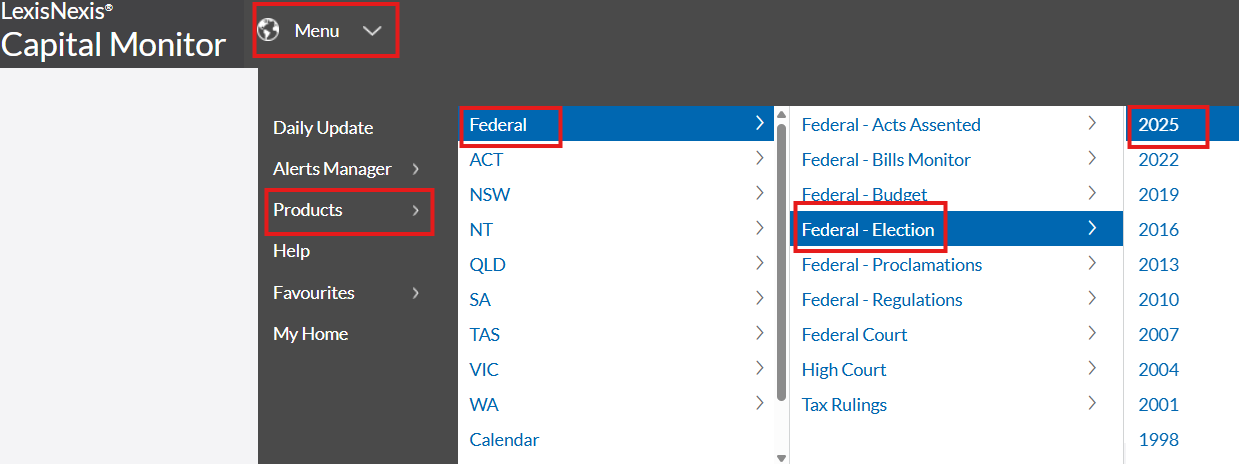
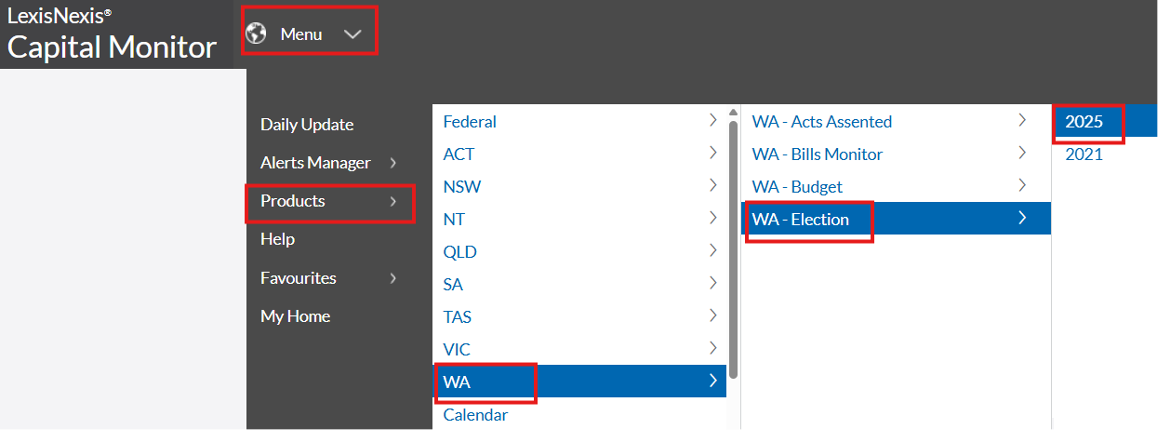
- Policy announcements made during the Election Campaign
- Seats in the Legislative Assembly
- Summary of votes by party
- Election Timetable
- MPs retiring
- Parliamentary Committees
- Caretaker Convention
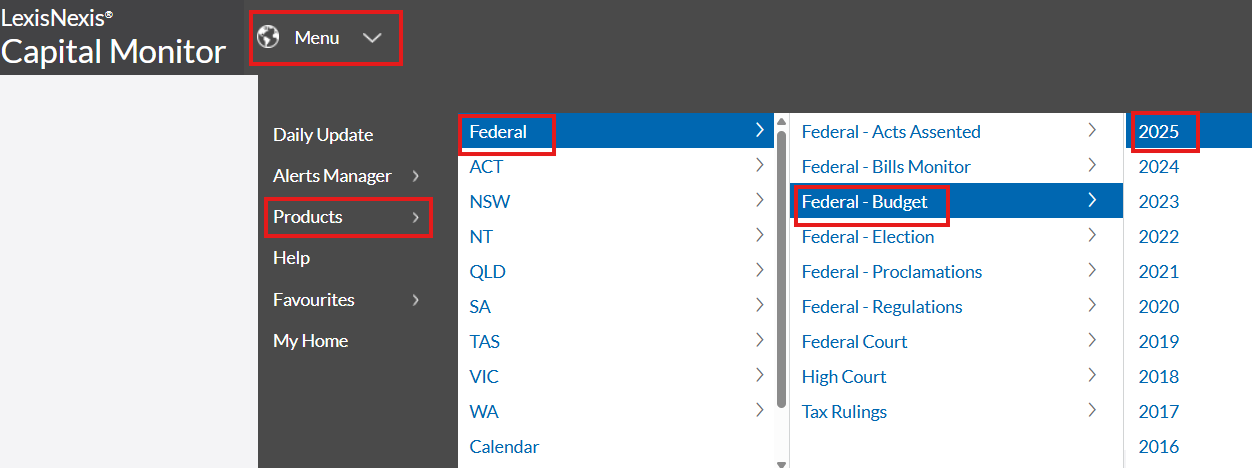
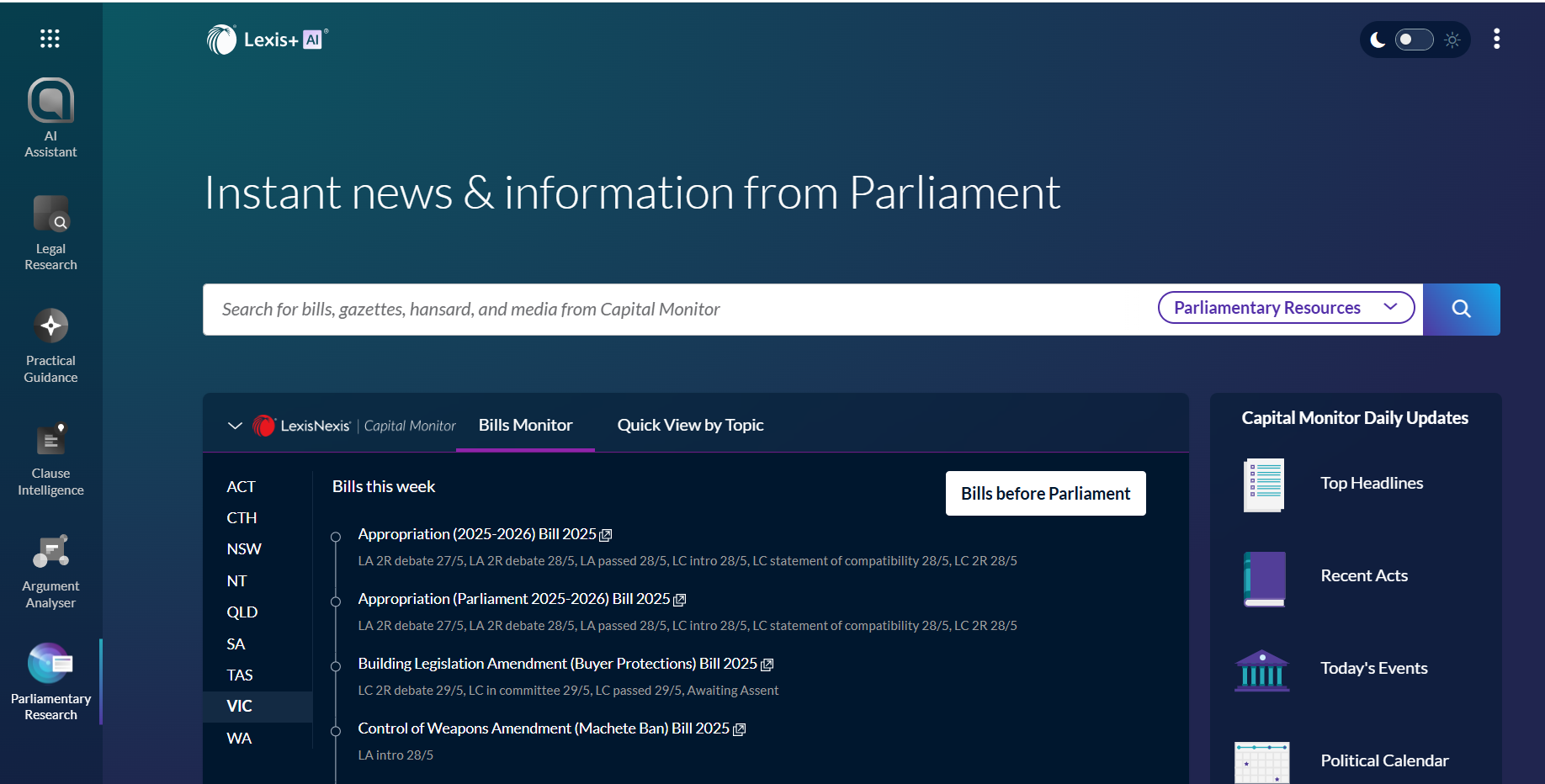
- Search to browse headlines across Parliamentary resources including bills, gazettes, hansard, and media within Lexis+
- Bills Monitor to follow the movement of Bills from introduction to assent with live updates available when Parliament is in session
- Quick View by Topic to track updates across a carefully curated list of entities and areas of interest
- Daily Updates feed with access to top headlines, recent Acts, scheduled events, and political calendars for upcoming Parliamentary sessions, Estimates, Budgets, Elections, and more

- Drive efficiencies in their workflows, by saving research time.
- Enjoy access to comprehensive international coverage, with concise summaries of market definitions and remedies which have been translated into English.
- Advise with confidence that you have access to competition law regulators’ market definition and merger remedies decisions, enabling compelling and timely submissions.
- Improve outcomes while managing risks, with access to routinely updated decisions – helping you safeguard the reputation of your firm.

- Faster Drafting - Minimise time spent researching and drafting by leveraging AI-generated summaries, insights, and proven language into your workflow.
- Citation checks – review and confirm the citations are accurate and up to date, with supporting linked authorities from the Casebase® Case Citator.
- Deliver documents in your style - Leverage your firm knowledge and client-specific language to draft new deals or contracts quickly, all while maintaining your firm’s unique style.
- Integrated precedents - rapidly surface relevant legal precedents, and successful language from your firm’s repository to strengthen arguments.
- Deliver outstanding work - Understand the legal implications of previous contract changes or revisions to select the most favourable terms and ensure profitability.




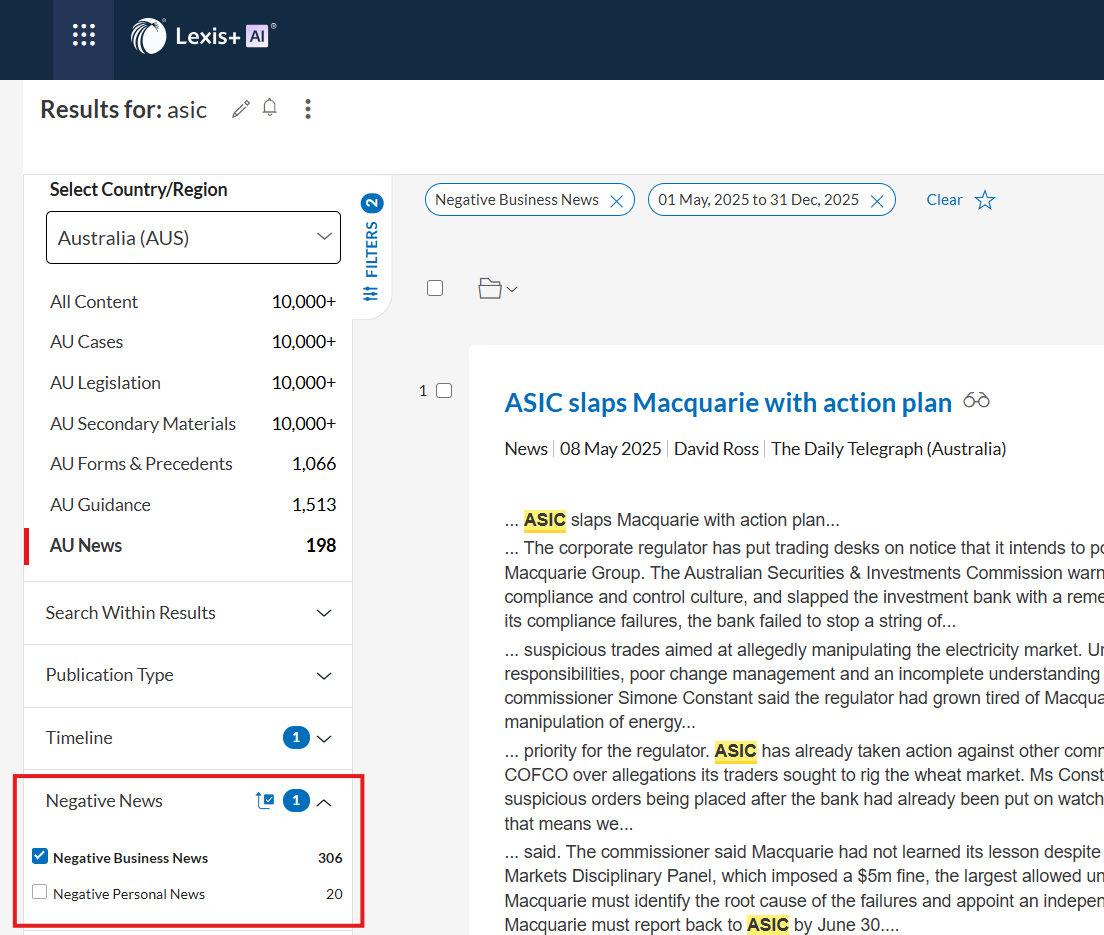

- My Content – saved searches will only be visible / editable by you
- Shared Content – saved searches will be visible / editable to all Admins for your organisation
- Group Content – saved searches will only be visible / editable to Admins added to a group
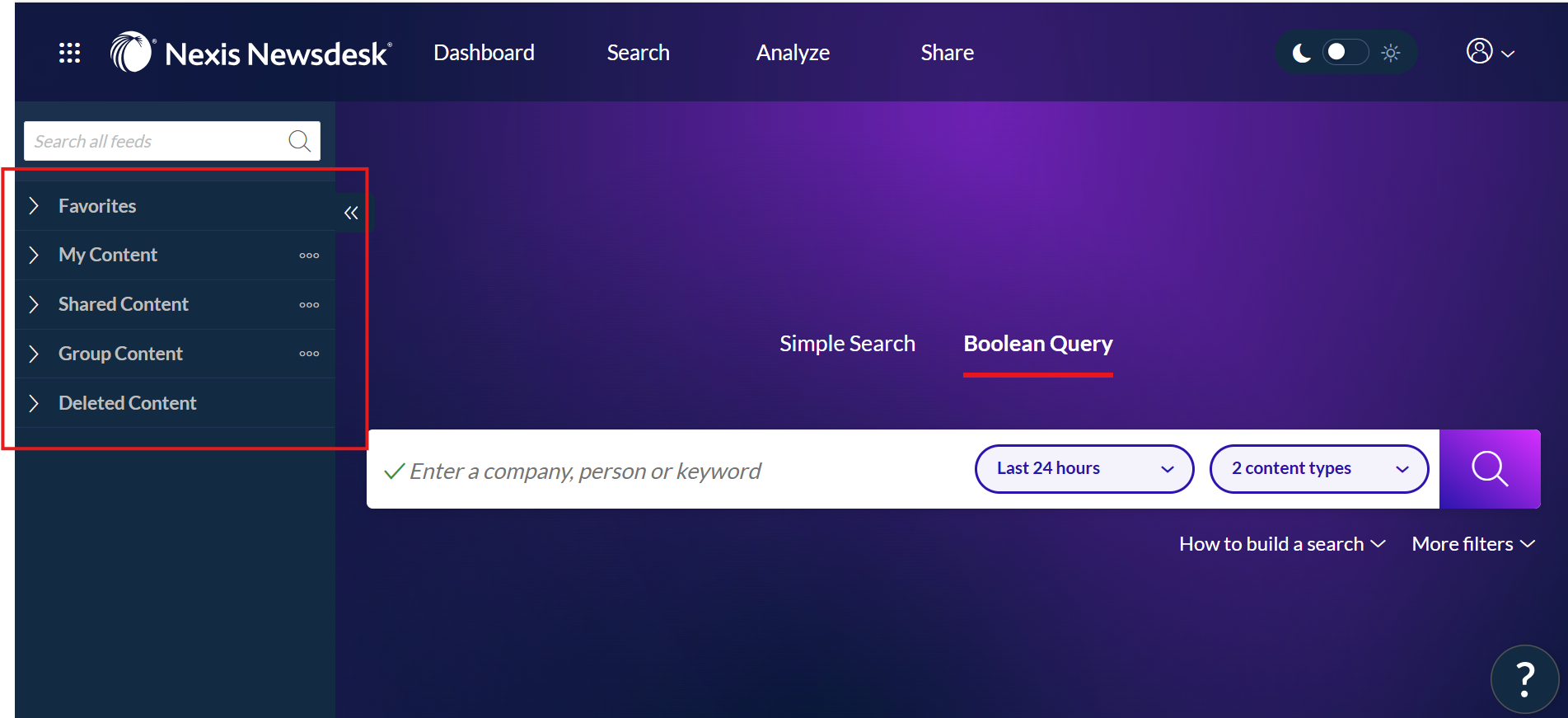
- Add Folder: click on the dots to the right of My Content, Shared Content or a group that has been added to Group Content. Add sub-folders to organise related queries, streamline workflow, and quickly locate the specific information you need.
- Download search criteria: click on the dots to the right of My Content, Shared Content or a group that has been added to Group Content to download. The search criteria report includes that name of the search, the folder it is stored in, search terms, sources, and filters applied making it quicker and easier to review searches and edit as required.
- Favourites: frequently used folders can be stored in Favourites to locate faster. Click on the dots to the right of a Folder and click the Star icon to add.

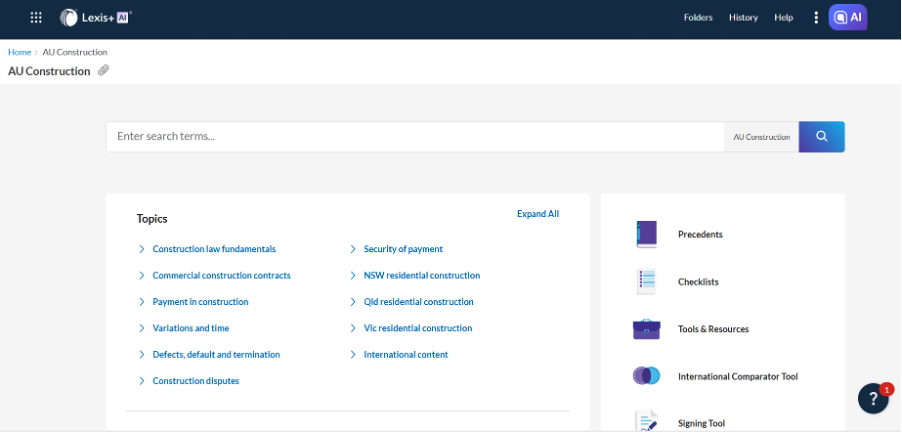
New | Subtopic: Buy now pay later (BNPL)
BNPL providers are to be regulated under the National Consumer Credit Protection Act (NCCPA) from 10 June 2025. Our new subtopic provides guidance on BNPL providers' new obligations under the NCCPA.
Coming soon | New topic: Debt capital markets
Our new topic will assist those advising Australian issuers, arrangers, and dealers on debt capital markets transactions. The topic will provide comprehensive guidance on:
- the types of debt securities (including zero coupon securities) prevalent in the Australian wholesale market
- key provisions in debt capital market transactions in Australia, with some comparison to market practice for international issuances
- documenting an Australian medium-term note (AMTN) programme
- the steps for establishing and issuing notes under an AMTN programme, and
- listing debt securities on the Australian Securities Exchange (ASX).
New | Topic: Anti-bribery and corruption
Our new topic Anti-bribery and corruption contains guidance in relation to domestic and foreign bribery and corruption as well as addressing bribery and corruption risks.
New | Training materials - Confidentiality
Our new training materials gives an overview of the law of confidentiality in Australia covering the legal and practical issues to consider.
Coming soon | Updated topic: Franchising
Our revised and enhanced franchising content covers the fundamentals of franchising and includes guidance on the new Franchising Code of Conduct.
Coming soon | New precedent: Limited partnership agreement
Designed to be used in a limited partnership arrangement.
New | Subtopic: The new merger control system from 1 January 2026
Our new subtopic takes a deep dive into merger reform, with guidance notes on the notification process, which transactions must be notified, and the amended substantial lessening of competition test.
New | Enforceable undertakings
Our new expanded guidance on undertakings includes recent examples of behavioural undertakings accepted by the ACCC.
Coming soon | Non-compete clauses / restraint of trade
Our planned detailed coverage of reforms in US and Australia.
Coming soon | Collective bargaining
Collective bargaining guidance on how to avoid breaching Australian competition law when bargaining as a group.
Coming soon | Guidance: Penalties for false or misleading representations
Guidance on the courts’ approach to issuing penalties for making false or misleading representations in breach of the Australian Consumer Law.
Coming soon | Guidance: Price gouging
Guidance on the definition and legality of ‘price gouging’ and the possibility of reform by the returning Albanese Federal Government.
Coming soon | Precedent: Short-form influencer agreement
New short-form influencer agreement precedent, to be used for low-value contracts with social media influencers.
Coming soon | Guidance: Advertising to children
Guidance on the various regulatory restrictions on advertisements targeted towards children.
New | Precedent: minutes of meeting for a proprietary company
A template designed to be used for member meetings for proprietary companies.
Coming soon | Tool: Financial Services Horizon scanner
A quick-reference resource summarising upcoming legislative, regulatory, and other relevant developments and reforms in the financial services sphere.
Coming soon | New content on Board observers and Board advisors
New precedents for a Board Advisor and Board Observer Agreement, a precedent resolution to appoint and advisor, as well as associated guidance relating to both Board advisor and observer roles and duties.
Coming soon | Checklist of AI Governance for boards
New checklist of steps to ensure effective AI governance for boards.
Coming soon | Guidance on continuous disclosure for specific disclosure events
Expanded guidance on continuous disclosure obligations in response to specific disclosure events (for example, a cyber incident).
New | Subtopic: Cyberthreats and cyberattacks
New guidance on business email compromise, ransomware and data extortion, insider threats and inadvertent disclosure, supply chain attacks, and new training materials on cyberthreats.
Coming soon | Topic: Cloud
New topic providing practical guidance and insights into the legal and commercial issues of cloud computing.
New | Topic: Technology in dispute resolution
New topic comprising three subtopics that provide practical insights about the ways that technology intersects with civil litigation and dispute resolution, including the use and management of digital evidence, technology-related issues in civil procedure, and the regulation of generative artificial intelligence in litigation.
Coming soon | Topic: Australian Capital Territory – Magistrates Court
New topic comprising 14 subtopics that address procedure and practice in the ACT Magistrates Court, including preparation of originating process, service, discovery, evidence, applications, costs, and appeals.
Coming soon | Topic: Cth – Administrative Review Tribunal
New topic addressing procedure and practice in the Administrative Review Tribunal, which launched in October 2024 and replaced the Administrative Appeals Tribunal.
Coming soon | Topic: Workplace Investigations
New topic providing guidance on practical considerations and principles relating to workplace investigations from receipt of grievance to finalisation of investigation.
Coming soon | Module update for the Family Law Amendment Act 2024 (Cth)
The Family Law Amendment Act 2024 (Cth) comes into effect on 10 June 2025 and makes significant changes to the Family Law Act. All guidance notes, precedents, tools, and checklists will be updated to reflect these major legislative amendments. In addition, there will be new guidance relating to the amendments to property settlements, including new guidance on companion animals. A new suite of Practical Guidance precedents will also be published to reflect the amendments to family law.
New | Application by company under restructuring to adjourn a pending winding up application
With the increasing numbers of small business restructuring appointments, practitioners are likely to have more clients asking them to act in applications to urgently adjourn pending winding up applications. This guidance note covers the legal framework and principles relevant to these applications and guidance on the practical steps involved in making the application.
New | Bankruptcy content
Expanded practical content for common matters and issues that arise when practitioners act for either a trustee or bankrupt including:
- Discharge and annulment of bankruptcy
- Debtor applications to review, set aside of appeal against a sequestration order
- Directions and consolidation of estates
- Trustee applications for possession or sale of land, and
- Examination summonses under s 81.
New | Expanded administration and liquidation guidance
Expanded content on conflicts of interest in voluntary administration and liquidation, which will assist practitioners to navigate this ever-present and contentious issue for insolvency practitioners. Expanded content on making an application for leave to transfer shares in a company subject to a deed of company arrangement.
New | Making an application for security for costs against a company in external administration
This new guidance note sets out the principles and the practical steps involved in making an application for security for costs against a company in external administration.
New | Training materials - Confidentiality
New white label training materials on the law of confidentiality in Australia covering the legal and practical issues to consider.
Updated | Guidance: Indigenous cultural IP
The First Nations fashion collaboration and international ICIP protection and ICIP case studies guidance notes, and the Checklist for Indigenous Cultural Intellectual Property Rights (ICIP) have been updated. With more developments expected in this area, there will be further updates to this topic coming soon.
Updated | Subtopic: Design infringement
The Design infringement subtopic within the IP litigation topic has been refreshed, with a new guidance note dealing with Design litigation issues added alongside the guidance setting out the key elements of design infringement. The corresponding Checklist for design infringement has also been enhanced, to be used in conjunction with the guidance notes when considering whether a registered design has been infringed and whether to commence an infringement action.
Updated | Precedent: Due diligence protocol for business sale (short form)
Updated due diligence protocol for business sale, covering due diligence questions and process in relation to a business sale.
Updated | Precedent: Share sale agreement (short form)
Updated share sale agreement (short form), for the acquisition of shares in a company.
Updated | Guidance Note: Post-listing obligations – related party transactions
Updated Guidance Note on related party transactions for listed entities and transactions with a person of influence.
Updated | Guidance Note: Post-listing obligations – significant transactions
Updated Guidance Note on significant transactions for listed entities, including major changes to the nature or scale of the entity’s business.
New | Topic: Total and permanent disability (TPD) claims
Our brand new TPD topic contains comprehensive guidance on the TPD scheme, eligibility and criteria for making a claim under the Commonwealth superannuation legislation, and caselaw-based discussions of the litigation process.
Coming soon | Updated guidance: Common law institutional abuse claims and the National Redress Scheme
Our updated guidance on institutional abuse claims and the national redress scheme will include expanded discussion of the considerations practitioners face when advising clients regarding the right type of claim to make, specific guidance to assist practitioners when gathering the necessary evidence to support claims, and updates to our existing guidance on damages to reflect recent court decisions.
Updated | Medical Resources
The Practical Guidance Personal Injury Victoria module has been enhanced to cover medical information more effectively.
The module has long included coverage of medical information prepared by a physician. This content has now been reviewed and revised by a mediator with particular expertise in medical negligence in order to render it even more practically valuable for legal practitioners.
In addition, the module is now actively drawing on the wealth of knowledge of the Victorian Coroners’ Court. Latest Legal Updates have been prepared to cover the court’s investigations into self-inflicted injuries, management of obesity, medical care of athletes, and dispensing of medication. These investigations have shed light on negligence, management of complex medical conditions, professional standards and documentation. They are valuable for lawyers because they provide contemporary examples of where a failure to follow established standards of care has contributed to adverse outcomes. In matters of insurance and personal injury litigation, evidence drawn from such inquests may indicate negligence, inadequate professional review, or a failure to obtain a comprehensive understanding of an individual’s medical condition. By understanding these issues, legal practitioners are better able to assess breaches of duty, causation, and the potential for liability in cases where clinical judgments have led to significant harm.
New | Updated guidance on residential tenancies
Updated guidance on residential tenancies in Queensland and South Australia, reflecting the most recent legislative changes within those jurisdictions.
New | Precedents for negotiating and completing acquisitions of commercial property and completing due diligence for commercial properties
New precedents for selling or buying commercial property, including heads of agreement, letter of intent, special conditions for making a transaction subject to completion of a due diligence process, and a new suite of precedents for undertaking a due diligence process for commercial property.
Coming soon | Updated guidance for Queensland
Updated guidance within the Sales and purchases, Property law fundamentals, Title to land, Encumbrances and Rural transactions topics, to reflect the changes coming into effect on 1 August 2025, upon the commencement of the Property Law Act 2023 (Qld).







